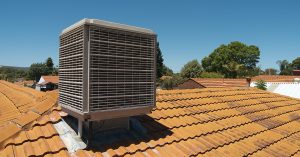Q:  Two owners in my condominium building had their air conditioner units moved to the roof of the building. Is this allowed? The association has not had the units moved back. Don’t we need to vote to change our common elements? (E.H., via e-mail)
Two owners in my condominium building had their air conditioner units moved to the roof of the building. Is this allowed? The association has not had the units moved back. Don’t we need to vote to change our common elements? (E.H., via e-mail)
A: Changes to the common elements which appreciably change the appearance or specifications of the building are known as “material alterations.” The work you describe is a material alteration.
Section 718.113(2) of the Florida Condominium Act provides that there shall be no material alteration to the common elements except as specified by the declaration of condominium. If the declaration is silent, 75% of all voting interests must approve the material alteration in advance.
The material alteration rule applies to changes made both by the association and individual owners. Most declarations require some level of unit owner vote for material alterations by the association. The voting requirement is often not triggered unless a stated cost threshold is reached.
Declarations are not consistent on the unit owner vote required to approve material alterations. Some are silent, meaning that 75% of the owners would have to approve. Some declarations give the board full authority to authorize material alterations by unit owners.
So, the answer lies in your declaration. I would recommend that you have a qualified Florida-licensed attorney review and advise you.
Even if the relocation of the air conditioner units was not an improper material alteration, if they are excessively noisy and create unreasonable sound intrusions into your home, you may also have a complaint based on the law of nuisance. You should also discuss this with your attorney. For example, I have seen disputes like this settled by the association requiring the owner of the air conditioner units to install vibration springs, vibration mufflers, or other equipment to minimize the noise.
Q: Can our condominium’s board deny a lease application based on the unit owner failing to timely pay a special assessment? (M.T., via e-mail)
A: A lease may be disapproved due to the delinquency of the unit owner if the condominium documents grant the association the authority to approve or disapprove leases. Specifically, Section 718.116(4) of the Florida Condominium Act provides that where a condominium association has the authority to approve or deny a lease, the grounds for denial may include the unit owner being delinquent in the payment of an assessment at the time the lease approval is sought.
If your association plans to deny the lease, it is important to review your condominium documents to confirm if there are any deadlines by which the association must act to approve or deny the lease application (30 days of receipt of a completed lease application is a common standard) and whether a failure to respond within that timeframe results in a constructive approval or not.
The association should involve its counsel and ensure that all communications comply with applicable debt collection laws. I have also seen situations where the prospect of denying a lease can be used to negotiate with the owner for payment of the outstanding amounts, sometimes by agreement to have the rents paid to the association until the account is current. Again, this should be handled by an attorney.
Q: I recently submitted a request to inspect the ballots and proxies for the past seven years. My condominium association said the only records they had were from last year’s meeting. Doesn’t this violate the law? (N.O., via e-mail)
A: No. Section 718.111(12) of the Florida Condominium Act sets forth the association’s obligations concerning official records.
While most records are required to be kept for seven years (and some permanently), ballots, sign-in sheets, voting proxies and all other papers and electronic records related to the votes of unit owners must only be maintained for one year from the date of the election, vote or meeting to which the document relates.